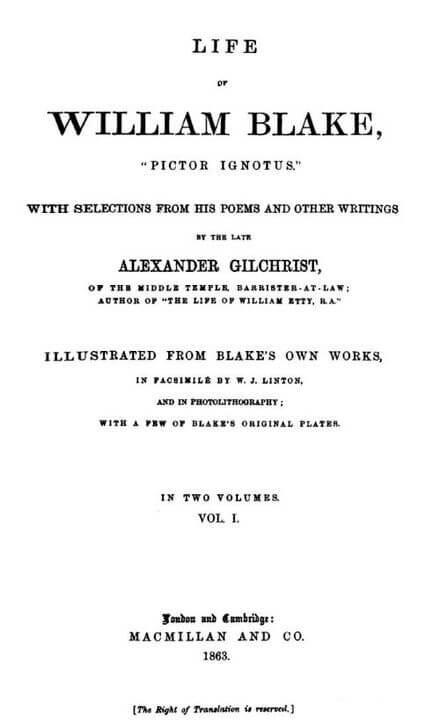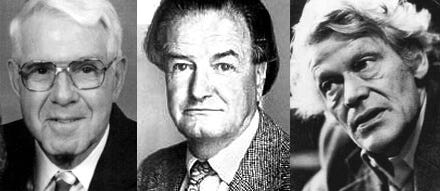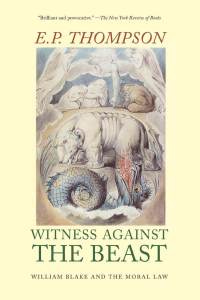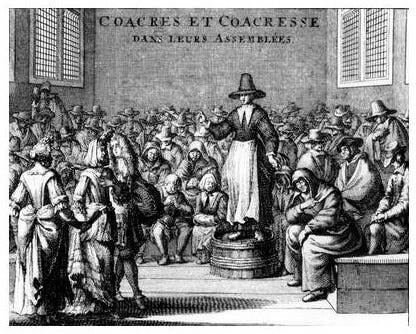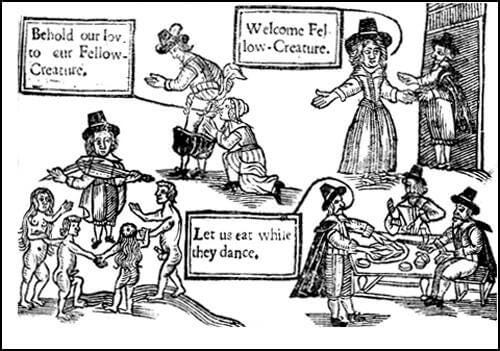Blake and the Mad Crew: Ranters and Historians
They say that the past is the slave of the present, and historians see in it mainly the projections of their private obsessions. There is no way around this conundrum, but no reason to despair either.
Here is a great cry, and at mid-night too; Behold, The Bridgroome commeth.
Here is a great pounding at the doors,—But it is not I, but the voice of my Beloved, that knocketh, saying, Open to me, and let me come In.
Abiezer Coppe, Some Sweet Sips, of some Spirituall Wine (1649)
… To all, even to those that impatiently, as well as to those that patiently read, and try the things that followeth.
Anon, A Justification of the Mad Crew (1650)
They say that the past is the slave of the present, and historians see in it mainly the projections of their private obsessions. There is no way around this conundrum, but no reason to despair either: you simply have to trust that your own obsessions will act for you more as a magnifying glass or compass than a set of blinkers. Nevertheless, this everyday fact of historical enquiry has left Blake studies in tatters when it comes to the matter of Blake’s fundamental orientation.
William Blake: Pictor Ignotus
Part of the problem is the fact that Blake spent his life in the shadows of history. Typically for a man of his class and beliefs, he was ignored in his lifetime by official history. There were no major contemporary studies of his work, no Royal Academy exhibitions or essays in the Dictionary of National Biography. He was sometimes scorned, but he was mostly ignored. After he died in 1827, anyone familiar with the facts might have guessed that he’d never be heard of again. Over the next few decades, the slender thread of his memory was kept intact by only a few surviving friends and patrons and a small circle of young artists who adopted him in his last years as principal inspiration (“the Interpreter”).
Almost forty years separate Blake’s burial at Bunhill Fields and the appearance of the first biography, by Alexander Gilchrist in 1863. Note the title of Gilchrist’s work, The LIfe of William Blake: Pictor Ignotus—‘pictor ignotus’ being the attribution given to a painting whose authorship is uncertain (‘unknown artist’). It is worth pausing for a moment to take on board that the most significant fact about Blake that occurred to his biographer forty years after his death was that he was unknown: unknown not only inasmuch as his genius was unrecognised, but also in that even those few people who admired his art knew little about its maker—his personal circumstances and the details of his life, and the nature of his beliefs and opinions. Consequently, Blake, having been buried in his own lifetime, had to be resurrected.
In many hands, Blake's books are like a picnic to which the author brings the words and the reader the meaning
It would be the work of subsequent generations of historians and enthusiasts to comb through parish records, private diaries, newspapers, official records and press notices to flesh out our idea of Blake. Add to this the fact that Blake’s work itself is so complex as to be open to many interpretations and you have the makings of a grand cockpit in which critics can dispute the nature of Blake’s vision forever, with opinions flowing back and forward with the tide of history, and not enough factual ballast to pin Blake down long enough to create a fixed image of him. The result, as E P Thompson noted (quoting Northrop Frye talking of Jacob Boehme) is that in many hands “his books are like a picnic to which the author brings the words and the reader the meaning”.1
As fashions in historiography shifted, historians have applied different lenses to their image of Blake. T S Eliot famously said that Blake suffered from “a certain meanness of culture”.2 The best scholars put spadework into disproving Eliot by teasing out the threads that bound Blake to other people, sketching out the pool of ideas from which Blake drew. Those who see Blake as a student of esotericism probe his connections with the likes of (Neoplatonist and translator of Porphyry and others) Thomas Taylor. Those that want to emphasise the ‘this-sidedness’ of Blake’s thought will plumb his connections to Thomas Paine, Joseph Priestly and the radicals instead.
But circumstances make the details hard to pin down. One contested issue concerns the depth of Blake’s connections with the left wing of the English Civil War generally and the Ranters—as the most radical of those groups—in particular. Operating in the same space as the Ranters were groups such as the Diggers and Levellers, Quakers, Muggletonians and Anabaptists. In what sense, if any, could Blake be said to have been influenced by such a tradition? The crucial figures considering Blake in this light were the Communist Party historians A L Morton (1903-1987), Christopher Hill (1912-2003) and E P Thompson (1924-1993).
Morton pioneered the approach of the Communist Party Historians Group in writing ‘history from below’ with A People’s History of England (1938). He promoted the political significance of the dissenters of the 17th Century, publishing a study of the Ranters, The World of the Ranters: Religious Radicalism in the English Revolution (1970), and an essay on Blake’s influences that focused on the Ranters in particular, ‘The Everlasting Gospel: A Study in the Sources of William Blake‘ (1958).3
Christopher Hill published his hugely influential work on the left wing of the revolution, The World Turned Upside Down: Radical Ideas During the English Revolution, in 1972.4 Coming later to the fray was E P Thompson with his Witness to the Beast: William Blake and Moral Law—the best account of the issues involved in reading Blake, even if he was wrong about Blake’s connections with the Muggletonians.5
Between them, these activist scholars cemented the image of the dissenters as representatives of a radical democracy strangled in the course of the revolution: prefiguring communism, yes, but cast in the mould of the libertarianism of the 60s counterculture. They established the role of antinomianism and millenarianism in English political history.
The image of libertarian communism in play at the start of the modern English radical tradition provided inspiration and a compass for Communist Party supporters like Hill and Thompson who left the party in the wake of the Soviet suppression of the 1956 Hungarian uprising and sought a better image of communism, free from Stalinist barbarism, as they built the ‘New Left’. As such, the researches of this group had a direct historical significance and impact over and above their role in establishing their politicised understanding of Blake and the dissenters.6
While Hill and Morton’s work had an enormous impact in the decades that followed its publication, finding an a popular audience larger than most historians ever experience, changing attitudes also saw their views subject to criticism from a number of quarters as the tide of 60s radicalism subsided.7
First were those who had perhaps been sympathetic to the New-Ageism of the 60s counterculture but not its confrontation with political power. They tended to see in Blake another figure in the lineage of Western esotericism and Hermeticism, an illustrator to the mind of Plotinus or ‘Thrice Great Hermes’, albeit a sublime artist. The poet Kathleen Raine, in particular, appealed to such an audience and had an impact reading Blake’s work through the lens of Neoplatonism. Her two-volume study, Blake and Tradition, has exerted considerable influence since its publication in 1969.8 As far as Blake studies go, Raine’s work and that of her students and acolytes is perhaps the main challenger to the paradigm established by the Left. The 60s counterculture had enthusiastically absorbed Blake and revived popular interest in him, and the two interpretations of Blake perhaps represented two sides of that counterculture parting ways.
Note that it is not a matter of choosing whether to treat Blake as a Jacobin or an esotericist, with one excluding the other, but of recognising the political dimension of Blake’s ideas, even when they were esoteric, and the esoteric roots of his politics. The esotericists tended to ignore or even deny the politics. The Marxists on the other hand, recognised the esoteric and mystical strains of Blake’s thought but could not take them entirely seriously—the thrust of their work on the dissenters was to show how religious ideas had political traction, but their commitment to what they thought of as materialism led them to see religious and esoteric terms as a kind of fog of verbiage you had to cut through to get to the political content, so that the religious expressions were just “political ideas in a religious form”,9 much as some Marxists believed that you have to cut through the Hegelian categories in Marx’s early writings to understand his materialist critique of alienation. It simply wasn’t done for CP Marxists to call for the masses to immanentise the eschaton.
Raine’s view of Blake remains academic even though her views are at odds with those dominant in the academy today
Regarding Raine’s interpretation, Thompson pointed out that her view of Blake remained academic even though her beliefs are at odds with those dominant in the academy.10 What he meant was that Raine sought to place Blake in a tradition of written authority and traditional learning, albeit that it was an alternative tradition grounded in Plotinus rather than thinkers in the Western mainstream. To locate Blake in such terms is to fail to understand the world in which he lived. Blake was widely read and not at all unlearned, but he was not a scholar. Neither was he what would come to be called an ‘auto-didact’, a term bound up in a hierarchical idea of knowledge in which the learning of the autodidact is acknowledged, but is emphatically not imagined to sit near the higher rungs of learning. The term is dismissive of the astonishing ‘witcraft‘ of the popular classes.
The alternative to treating Blake as a scholar, setting out to discover what political and dissenting books were in his library, is to try to understand the intellectual mode in which his inspired mind operated, which was not unique to him but a manifestation of a plebian tradition of dispute and inspiration. Ultimately we must learn to think in that style ourselves if we are to know what was on Blake’s mind. We can ask, not whether Blake read the Ranters, but what he would have thought if he had read them. Would he have recognised them as comrades?
Publicans and Leathern Aprons, Cloakes and Cassocks
As to this peculiar mode of thinking and intellectual being employed by Blake and his peers, it is described by Thompson as follows;
… we have become habituated to reading in an academic way. Our books are not ‘thumbed by graving hands’. We learn of an influence, we are directed to a book or to a ‘reputable’ intellectual tradition , we set this book beside that book, we compare and cross-refer. But Blake had a different way of reading. He would look into a book with a directness which we might find to be naive or unbearable, challenging each one of its arguments against his own experience and his own ‘system’… He took each author (even the Old Testament prophets) as his equal, or as something less. And he acknowledged as between them, no received judgements as to their worth, no hierarchy of accepted ‘reputability’. For Blake, a neighbour, or a fellow-reader of a periodical, or his friend and patron, Thomas Butts, were quite likely to hold opinions of central importance as was any man of recognised learning.11
In this tradition experience is laid directly alongside learning, and the two test each other. There is nothing of our present academic specialisation: thought may be borrowed, like imagery, from any source available. There is, in this tradition, a strong, and sometimes an excessive, self-confidence. And there is an insistent impulse towards individual system-building: the authority of the Church, demystified in the seventeenth century, had not yet been replaced by the authority of an academic hierarchy or of public ‘experts’. In Blake’s dissenting London of the 1780s and 1790s this impulse was at its height. Men and women did not only join the groups on offer… they fractured them, took a point from one and a point from another, conceived their own heresies, and all the time struggled to define their own sense of system.12
It is this inspired confidence (taking each author of the Old Testament as an equal) that allowed early Christians and heretics ever since to write their own gospels, as Blake did. To the literal mind, this is a sort of forgery. But for the inspired, to read ‘in the spirit’ was to be transformed into the equal of anyone and to participate in the intellectual democracy of the Saints. And, having read, they were obliged to prophesy. The Ranters understood that theirs was a different kind of knowing, but they believed it to be at least the equal of the scholars’. Abiezer Coppe declared as much;
… it is neither Paradox, Hetrodox, Riddle, or ridiculous to good Schollars, who know the Lord in deed, (though perhaps they know never a letter in the Book) to affirm that God can speak, & gloriously preach to some through Carols, Anthems, Organs; yea, all things else, &c. Through Fishers, Publicans, Tanners, Tent-makers, Leathern-aprons, as well as through University men,—Long-gowns, Cloakes, or Cassocks; O Strange!13
To say that ‘God can speak through Fishers’ &c is to say that knowledge gained through inspiration is equal to that produced by scholarly learning. Blake was presumably making a similar point—perhaps elevating reading ‘in the spirit’ further still—when he said that “the Beauty of the Bible is that the most Ignorant and Simple Minds understand it Best”.14
To view the history of the lower classes and their beliefs exclusively through an academic lens is to risk losing sight of them altogether. The views of the dispossessed are mostly ignored anyway in the records we have, while the views of dispossessed heretics and radicals are actively misrepresented. But far worse than this, from a scholarly perspective, is that the most radical views could perhaps never be adequately represented in the literature anyway because these ideas are simply incomprehensible to anyone else—’off the scale’ of conventional wisdom and incommensurable with it, because, in Boehme’s word, “the Natural Man receives not the Things of the Spirit, nor the Mystery of the Kingdom of God, they are Foolishness unto him, neither can he know them.”115
The danger of viewing history academically—or at least purely academically—is that the traditions we are interested in evaporate under the heat of that type of scrutiny. Modern scholars have done amazing work tracing documents. Recently they have even been able to use computers to make complex textual analyses and comparisons that were inconceivable only a few years ago. We now know more than ever before about such traces, connections, overlaps and entanglements in the texts. But while this can tell us much of an external nature about its subject, none of it can take us to the heart of the matter. To reconstruct such suppressed traditions requires an act of imaginative identification not allowed to the scholar.
This systematic disconnect between scholars and their subject matter in this domain can make the latter seem evanescent and unreal to them. Thus the historian Ariel Hessayon, who has documented many fascinating aspects of radical history, ends up concluding that “though radicalism lacks a connected history, the imagined relationship between radicals of the English Revolution and their predecessors and successors has served as a powerful substitute.”16
This is true in a sense, but it needs to be emphasised that it is precisely such imagination that underpins the continuity of radical countercultural traditions. This continuity may well be ‘fabricated’, constructed in part by an act of the imagination, but it is as real as any tradition built on the continuity of doctrine… actually, more so.
Part Two: Blake and the Ranters
A L Morton said that “It is not possible… to show… that [Blake] had read any of the works of Muggleton, or of Abiezer Coppe… What can be shown is that he and they shared a common body of ideas and expressed those ideas in a common language.”17 Of course, evidence of Blake’s reading the Ranters may yet turn up, but the implication is that in the meantime we can try to connect Blake to the Ranters not by detective work tracing Blake’s reading but through comparing his productions, his poems and his art, to what we know of the Ranters, reading the Ranters from Blake’s point of view.
Such a comparison is difficult. We can find echoes of the Ranters in Blake’s work, but we can find echoes of other groups too, often by considering exactly the same phrase or quotation. It is easy for us today to underestimate how much, eg., the language of the Book of Revelation and of millenarianism was part of the intellectual bedrock of earlier eras. The various sects may have differed as who precisely they saw as, let’s say, the ‘Woman Clothed in the Sun’, who would give birth to the redeemer. but they agreed that someone or something must correspond because the Revelation of John was a divinely authorised vision of the Final Judgement which everyone knew was immanent.
Antinomianism doesn’t just mean that we can flout the moral law—God can too
Our reading problems are further compounded by the difficulty in agreeing who was or was not a Ranter. The Ranters did not keep membership lists because they did not have members as such, since they were not an organised group. “The Ranters were rather a movement than a sect”, says Morton.18 Not only that, but they were partly defined from without—any of the then sects and ‘gathered churches’ might see their own more extreme brethren as ‘Ranters’ and denounce them as such. But the Ranters certainly existed. To see them we have to take the dive, immerse ourselves in the words of these extremists and try to read them ‘in the spirit’ ourselves to see where they might share a common world with Blake. We have to read the Ranters the way Blake would have read them (perhaps even with “a naive and unbearable directness”) to imagine how Blake responded. If this goes beyond the call of traditional scholarship, then so much for traditional scholarship. We should not allow it to impede us.
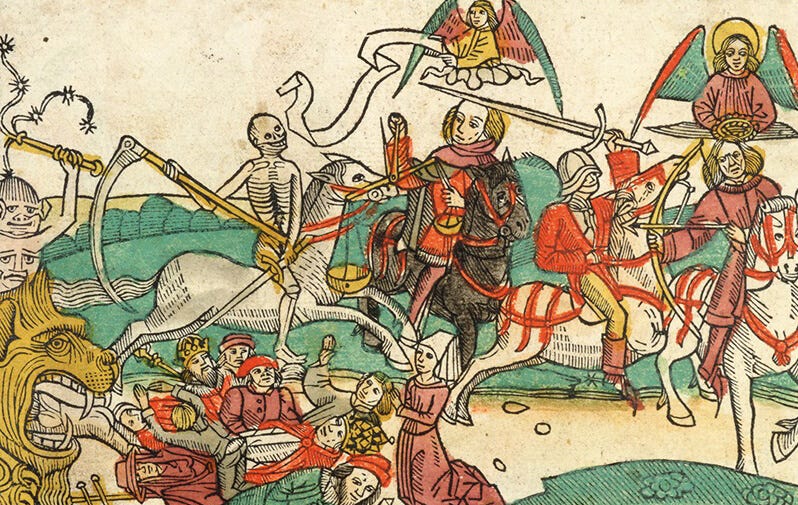
A Justification of the Mad Crew
If we want to know what the Ranters believed in order to make a comparison with Blake, as a first pass you could do worse than considering the anonymous Ranter tract, A Justification of the Mad Crew (1650)19, which lays out what it claims are the Ranter principles in a series of chapters, whose headings I abbreviate below.
(i) There is but one God
The first Ranter ‘principle’ is that of the unity of God, which is the root of all the others and represents the essence of their vision. It is first put indirectly by the author, who accuses his readers of worshipping two gods;
There is another God you set up, and that is such a one that is in one, not in another, cursing one and blessing another, and so dam God as to the greatest part of the creation, that he is onley in Saints, in a few, but he is not the God of all, and who is their God, who acts in the wicked, one called a Devil, another Spirit, and so they make something to be besides God; and if God be not the same, and only he, in one as in all, and all as in one, then there is another being, another eternity.20
If this rejection of any dualism is taken seriously, as it was by the Ranters, some radical conclusions follow, and the author spends the following chapters drawing them out. But this fundamentalist monism is itself worth dwelling on. In rejecting the dualism of God and the Devil what is ultimately also jettisoned are the corresponding dualisms of good and evil, master and servant, and even eventually of knower and known, subject and object.
In place of dualism, what Blake depicts in his great poems is the development of the world from a single principle, with primal forces splitting and giving birth to new, contradictory powers. We are in deep enough waters already connecting Blake to the Ranters, so it won’t do to talk too much of Jacob Boehme right now, suffice to say that in Blake’s hands Ranter metaphysics is given a subtle reworking in which all of the contraries of existence are seen as aspects of a unitary deity, and this subtle dialectic resembles Boehme’s attempt to show that God’s fire and his coldness, his mercy and his wrath, are two sides of the same cosmic coin.
This radical monism led both the Ranters and Blake to be accused of materialism at times. And from every point of view that matters this really is a kind of materialism, because what it is most sharply pitched against is the idealistic separation of mind and matter that underpins society and justifies the social order. Just as Blake thought Milton was “of the Devils party without knowing it”,21 When it comes to materialism it seems that Blake, very much like Hegel, was also ‘of the Devil’s party’.
Some argue that Blake is a Gnostic. It is true that Blake plays with Gnostic terminology—for instance, at one point calling Urizen the “mistaken demon of Heaven”, treating him as a usurper, just as the Archon’s usurped God’s role as creator22—but Blake’s basic position is monist and singular. In one of his most carefully elliptical formulations he says that “Man has no Body distinct from his Soul for that calld Body is a portion of Soul discernd by the five Senses”23. There is no body beyond the soul, no matter without mind. If Blake is wary of corporeality it is not because nature is actually apart from us but only because we lack the imagination to escape the trap of “single vision and Newton’s sleep”.24
(ii) God is served in all things and persons
If God is in all things, then all things are holy. There are not two principles ruling the world—good and evil, God and Satan. Rather, “the Devil is but a part of Gods back sides”.25 Not only is this true in a bluntly ontological sense, but morally too. God exists and acts “in the wicked as in the godly, as in him that steals, lies, swears, and is drunk, as in him that swears and lies not”.26 Here we leap right into the heart of the Ranters’ antinomianism, in which even acts traditionally thought of as sinful are redeemed. The author believes that many people serve God;
in these things drunkenness, swearing, lying, whoring, and yet knowingly in light in truth, some that do these things, yet do no evil, acting it in a holy way as holyness, swearing holily, and drinking holily, whoring holily, all is holy, righteous and good that they do, and they meet the Lord in these.27
“the Almighty is frollick and merry, and jocund in these foolish vain things”
This is not the tepid argument that, as everything is holy, everything is permitted, or the legalistic pleading which says that “to rise above sin, one first has to experience it”. In a particularly memorable passage the author argues that God actively uses supposedly sinful, idle activities as a kind of communion with the believers:
the Almighty is frollick and merry, and jocund in these foolish vain things, and the Lord clads himself with these fopperies and fooleries, and comes forth to the people in this gay apparel in this fools coat, and the people admire him and stare upon him, and fall down to him; and thus the Lord is every ways served in all things.28
Antinomianism doesn’t just mean that we can flout the moral law—God can too. This idea that God descends to meet man as much as man aspires to rise toward God is echoed very precisely in Blake in one of his earliest works, There is No Natural Religion, when he says “God becomes as we are, that we may be as he is”.29 Blake thus saw that many acts denounced from the pulpit as foolish and sinful were simply part of the world of the underclass and could be embraced. They were denounced as form of discipline and social control. The Ranters met and preached in inns and taverns, and drank and smoke while they did so. Similarly in The Little Vagabond Blake says;
… if at the Church they would give us some Ale.
And a pleasant fire, our souls to regale
We’d sing and we’d pray, all the live-long day;
Nor ever once wish from the Church to stray,
…
And God like a father rejoicing to see,
His children as pleasant and happy as he:
Would have no more quarrel with the Devil or the Barrel
But kiss him & give him both drink and apparel.30
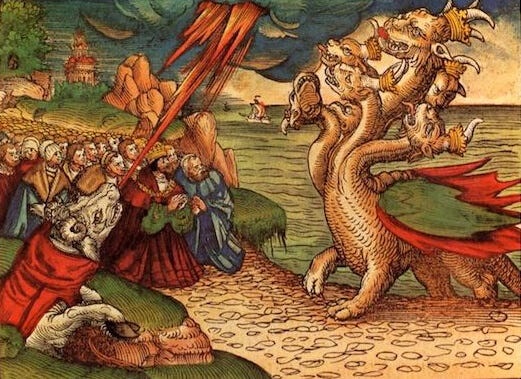

(iii) Good and evil are both one
Here the antinomianism implied above is made explicit, and the origins of the moral law are explained: the moral laws of man that define good and evil are the result of the Fall:
Man, innocent, holy upright man, tasting of the tree of knowledge of good and evil, comes to divide and separate that which God had joined together, and thereby became accused, calling one holy another unholy, this is a good man that an evil man, and so hates the one and loves the other, joins to the one and separates from the other: but the holy innocent man knows not, owns not any such distinctions, from whose throne flies every unclean and corrupt thing.31
This mirrors Blake’s arguments precisely. For Blake, the ‘stony laws’ of the Commandments are to be rejected. If Blake has some similarity to the Gnostics it is not in how he saw the world created, but how he saw the moral law originated. Just as the Gnostics believed the world was created not by God but by a blind and mad archon, Blake believed that those laws the Church says were ordained by God were in fact the weapon of ‘Satan the accuser’ acting in man;
Christ comes as he came at first to deliver those who are bound under the Knave not to deliver the Knave. He comes to deliver man the Accused and not Satan the Accuser.32
One easily imagines Blake called to the witness box to speak in defence of the Ranters, accused by their enemies of immorality and license;
In Hell all is Self Righteousness there is no such thing there as Forgiveness of Sin he who does Forgive Sin is Crucified as an Abettor of Criminals. & he who performs Works of Mercy in Any shape whatever is punished & if possible destroyd not thro Envy or Hatred or Malice but thro Self Righteousness that thinks it does God service which God is Satan… Forgiveness of Sin is only at the ]udgment Seat of Jesus the Saviour where the Accuser is cast out. not because he Sins but because he torments the Just & makes them do what he condemns as Sin & what he knows is opposite to their own Identity.33
In Blake’s Marriage of Heaven and Hell, the fiery spirit of revolution starts by rejecting the moral law, which leads to the end of social violence and the existing order; “the son of fire in his eastern cloud… stamps the stony law to dust, crying Empire is no more! and now the lion & wolf shall cease”34
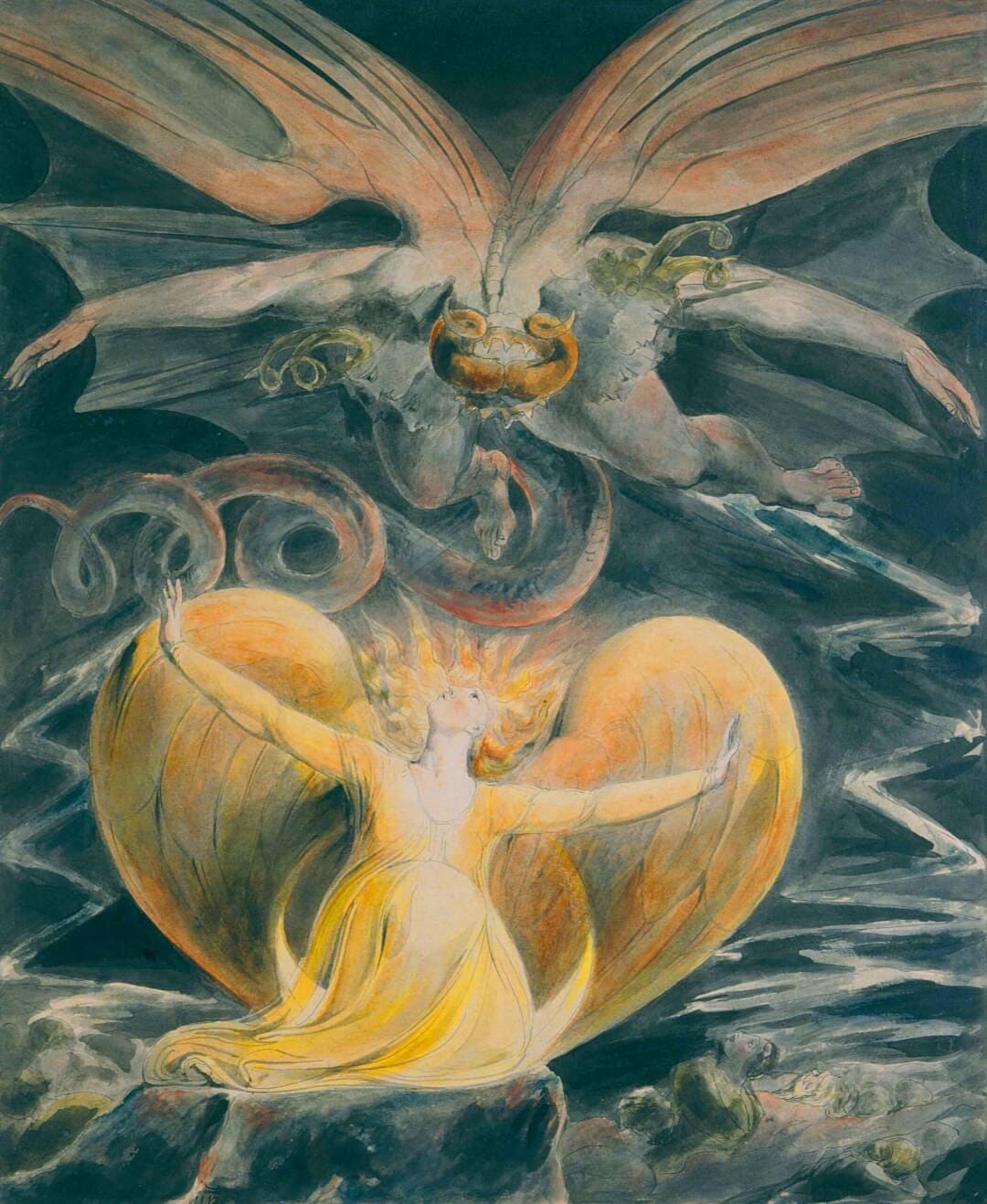
(iv) God is no respecter of persons
This is a further extension of the basic insight as to the unity of God. But whereas before the distinction the author sought to overcome was that between the accused and the accuser, here the argument is extended to give it a more directly political edge, aimed at the heart of social hierarchy—at the distinction between ruled and ruler;
God… beholds all things and persons, with the same and in the same purity, with and in the same glory… He loves all with an everlasting love, the thief that goes to the gallows as well as the Judgement that condemns him… the Cavileer as the Round-head… He pulls down the mighty from their Throne, and sets up men of low degree.35
We are now some way away from ‘the rich man in his castle, the poor man at his gate’. Few today would bat an eye at the claim that all are equal in such a manner—in principle at least—but such a radically democratic view, taken to its extreme by the Ranters, was far from acceptable in their time. It should go without saying that Blake shared the positively disrespectful views of the Ranters in this regard. Blake was a Jacobin and social leveller at heart.
v) The godly shall go to hell, the wicked to heaven
Speaking of the traditional idea that the righteous shall go to heaven, our author says;
The truly righteous need not, yea cannot go thither; for they are, and alwaies were in Heaven, yea while they are upon Earth; The righteous that sin not, that are without fault, are ever really and truly before the throne in God, and God in them, singing for ever Hallelujah to the Lord, so that these holy ones enter not into such a vain, empty, foolish, imaginary Kingdom, know not such a Heaven. And the seemingly righteous that know good and evil, that choose the one and hate the other, they neither go to this Heaven and are not thus saved, for they are already in Heaven and know it not, it is with them as with Jacob, ‘the Lord was here and I knew it not’.36
These people [the Ranters] are entered into heaven, attained this resurrection, are entered into this land of Canaan: you are yet in the wilderness some of you, others of you come to the borders…37
In Blake’s world this is like the idea that we must acquire “fourfold vision”,38 so as to leave this quotidian world and “hold infinity in the palm of your hand, and eternity in an hour”39 As with the Ranters, this is not the sort of heaven you gain entrance to with good deeds, but one that all can enter freely through the power of vision and imagination, for “This world of Imagination is the World of Eternity it is the Divine bosom into which we shall all go after the death of the Vegetated body. This World [of Imagination] is Infinite & Eternal whereas the world of Generation or Vegetation is Finite”40
The finite world of vegetation is indeed utterly different to that of the infinite world of vision, but it is not separate from it.
vi) They have overcome death
The Ranters when ‘in the spirit’ have gone to heaven. In any case, they have died, yet they live: “No marvell they are mad men for they are newly come out of their graves.” 41This is the Last Judgement and resurrection which the Ranters believed was coming to all, as the spiritual epoch of the Holy Ghost approached.
At this point the author affirms that, in joining with God, the Ranters have left the traditional moral world behind:
Shame that is propper to mortal Creatures, those that are under death and sin, this flyes before them, they are not ashamed of ought they do: they are naked as Adam and his wife was in Paradise and are not ashamed, they are past shame.42
At this point we can recall the story Thomas Butts tells of visiting the Blakes at their home in the Hercules Building in Lambeth, and on entering their garden finding William and Catherine naked. “Come in!” cried Blake; “it’s only Adam and Eve you know!”
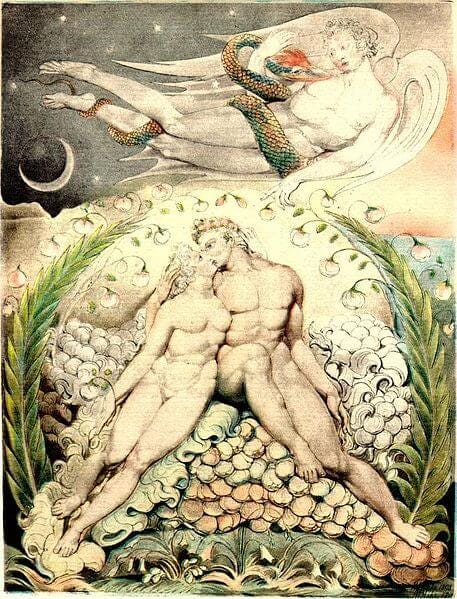
vii) They neither marry nor are given in marriage
The author’s argument against marriage is not based so much on the rejection of a code that bans love outside of marriage, but appeals instead to the fundamental persuasion of the Ranters concerning the unity of God:
The sons of darknesse… marry, take one woman, two or three or a few apart from the rest of the Creation, love them at a distance from others: those whom they have thus elected… are estranged to the other part of the world, who are really theirs, flesh of their flesh, and bone of their bone as they… There is such a unity where there is this diversity, and such a diversity where there is this unity, that they cannot kisse one but they kisse all, and love one but they love all, and cannot take one into bed with them and leave out another, but they destroy this unity and diversity.43
There should be no need to remind ourselves here of Blake’s belief that marriage was an expression of women’s oppression. I have discussed elsewhere the currents in the Swedenborg church that promoted women’s liberation and advocated ‘concubinage’ in place of traditional marriage, with which Blake may have been familiar. Blake, of course, was married, and no doubt so were many of the Ranters. The common line of march here involves overcoming exclusion, possession and jealousy in personal relations.
“there is meat enough in our father’s house, and shall we perish for hunger?”
viii) They hold all things in common
Again the author appeals to the unity of God for his argument: “canst thou not yet see the earth to be the Lord’s, and the fullness thereof? Then what has thou?”44 He adds;
… these people whom ye call mad, have learned this Wisdom… and saith, what is mine is every ones, and what is every ones is mine also: every woman is my wife, my joy and delight, the earth is mine, and the beasts on a thousand hills are mine: they have brought all they have, and have laid all down at the Lords feet, and if any keep back part he is accursed… O there is meat enough in our fathers house, and shall we perish for hunger? it is a full house, a rich house, full of all fat things, why should we then dy by staying without, by living in a far country?”45
Blake shared an opposition to possession even if he did not call for all things to be held in common. In this regard he was not, as they say, singing from the same hymn sheet as the Ranters. Blake’s primary political concerns were with ending of oppression. He did not see the need to abolish private property to achieve this, only perhaps the acquisitive mentality.

Panpsychism in Blake and the Ranters
Before concluding, there there is another aspect of Ranter thought, not dealt with as a principle by our author, but worth highlighting in connection with Blake. We have seen how the Ranter’s overwhelming sense of the unity of God led them to antinomian and even communist conclusions. Another implication points toward panpsychism and pantheism, which the critics of the Ranters certainly accused them of.46 Believing that God is “not witholden from any thing”47, how can there be anything not suffused with the divine? Hence pantheism, though of course, this is a tendency in a number of dissenting traditions of the time, and not specific to the Ranters.
There was a range of opinion among the Ranters on this. All of them believed God acted in men. Some Ranters included the animal world as agents of the divine, arguing that God acts “as divinely and holily… in beasts as in men”.48 A few went further still, believing that God acts only in the created world, and has no separate transcendental existence. Blake took the latter, most radical position, famously arguing that God ‘acts in man’, indeed he went beyond that to say that “God only Acts & Is, in existing beings or Men”.49 He extended this attitude to other animals as ‘fellow creatures’. I don’t say Blake was a pantheist. He could best be described as having a materialist theology, and possibly even of being an atheist. But there is certainly a powerful sense throughout Blake’s work that nature is suffused with the same spirit that animates man.
In The Marriage of Heaven and Hell Blake asks “How do you know but every Bird that cuts the airy way, Is an immense world of delight, closed by your senses five?”50 In Songs of Experience he toys with an identification with the insect in his poem The Fly: “Am not I / A fly like thee? / Or art not thou / A man like me?”51 The most consistent way to understand these lines is not simply as empathetic extensions of psyche from man to other animals, but as a panpsychist recognition that, whereas all nature is alive with psyche,52 psyche in animals is likely capable of experience somehow analogous to our own and, who knows, possibly even in some sense a higher form of experience, closer to God, because ‘unfallen’.
Blake’s attribution of experience to his bird in flight is surprisingly compatible with the views of a long line of supposedly ‘hard-nosed’ scientists, from Edison to Eddington and Einstein, and philosophers from Empedocles to Kant, Bergson and beyond, who all believed that matter had innate mental properties. This attitude of Blake and the Ranters is of special relevance at a time when humanity desperately needs to build a new relationship with nature in order to avoid ecological disaster on a scale that would satisfy the Four Horsemen of the Apocalypse.
Conclusion: The Real Congregation and the Real Blake
I knew of the Ranters before writing this essay and had read Ranter pamphlets.53 I had the impression that they thought like Blake generally. Reading A Justification of the Mad Crew has cemented this view. In the architecture of their thought, from its monotheistic foundation through to the antinomian, levelling, libertarian and pantheist conclusions they drew from it, Blake and our anonymous Ranter author share many affinities. There are differences too, especially with the greater emphasis placed on ‘common ownership’ by the Ranters. Reading through a single pamphlet to make such connections and distinctions is not a rigorous approach, but it is enough to convince me that, despite the differences, Blake and the Ranters spoke from much the same place.
If one looks at other dissenting groups at the time of the English Civil War, there are many shared views—a Joachimite belief in the approach of the end times, the distinction between ‘natural man’ and men of the spirit, the levelling tendency, and so on. That makes it harder to say what Blake shared doctrinally with one group over another. But one powerful connection between Blake and the Ranters that separates them from their peers is a common sense of the immanence of the divine—not a woolly belief that God is always somehow around us, but rather that he is powerfully acting in everything right now, that the world is, as it were, supersaturated with the divine. As the Quran has Allah say, “We are closer to [man] than [his] jugular vein,”54 so that it only takes a subtle (but immense!) shift of perspective to join with him. In this both the Ranters and Blake were like spiritual Left Communists, insisting their revolution was an actuality and not merely a prospect for the distant future. The flame only needed to be ignited.
On the other hand, Blake was not simply just another Ranter, as he was not just another Swedenborgian or Moravian or Neoplatonist or anything else. He was a profoundly original poet and artist. It is just that his originality and genius worked in the service of a broader tradition of inspiration. There is a subtlety and richness to his thought that takes him beyond the Ranters, quite apart from his unparalleled outpouring of images, both visual and poetic, illustrating his primal myth of Orc and Urizen and all, and of Albion, London, four-fold Golgonooza and Jerusalem, and his appropriation of Milton. This imagery and vocabulary is related to that of the Ranters and the prophetic books of the Bible, but it is not reducible to its sources. To return to our original question as to whether Blake was influenced by the Ranters, while it would be interesting to discover that Blake read texts by Coppe in the library of one of his acquaintances in the New Jerusalem Church, ultimately it is not the important thing. To complain alongside T S Eliot of the ‘meanness’ of Blake’s culture is simply to insult him. Blake did not live in a cultural vacuum. Only someone like Eliot could imagine that other people live their lives in such a vacuum, and that ‘culture’ is the property only of the few. Blake possessed a rich and vibrant culture, but it was not based on studying the Greeks and doing a Grand Tour of the continent. Instead, it was rooted in the dissenting culture of his family, and of his friends, colleagues and associates, who he chose accordingly. It is beyond doubt that one way or another this culture was informed by the ideas and materials of the Ranters along with many other sects, groups, traditions and tendencies in history. If we may never know the precise ways, and in what proportions, some of those influences were joined in the melting pot of the dissenting tradition, it does not matter as much as the fact that by reading the Ranters or studying the art of Blake—and doing so ‘in the spirit’—we learn to throw off ‘Newton’s sleep’ ourselves so as to join the one timeless radical community Blake and the Ranters both believed to exist—the congregation and its communion outside of time, where Blake and the Ranters themselves met.
E P Thompson, Witness Against the Beast: William Blake and the Moral Law, New York: New Press, 1993, pxi.
T S Eliot, Selected Essays, NY: Harcourt, Brace and World, 1960, p279.
A L Morton, ‘The Everlasting Gospel: A Study in the Sources of William Blake’ (1958), in History and the Imagination: Selected Writings of A L Morton, Margot Heinemann and Willie Thompson (eds). London: Lawrence & Wishart, 1990.
Christopher Hill, The World Turned Upside Down: Radical Ideas During the English Revolution, London: Penguin Books, 1972.
E P Thompson, Witness Against the Beast: William Blake and Moral Law, New York: New Press, 1993.
The role of Communist Party members in reviving a radical libertarianism outside of the CP is ironic, given that the impetus for this looking back into history and the rediscovery of the Diggers, Levellers came from the Russian Communist leadership and their turn toward the Popular Front, which required among other things that local parties make propaganda to show that their country had its own communist roots and traditions. See Raphael Samuel, ‘A Rebel and His Lineage’, in A L Morton (1971), p23.
I will ignore J C Davis, Fear, Myth and History: The Ranters and the Historians (1986), which essentially argues that the Ranters were the invention of Communist agitators, as it is now, justly, widely disregarded. At the time of its publication, however, the book had quite an impact, with Kenneth Baker, Conservative Minister of Education, telling the press in 1986 that it was his book of the year. Academic historical debates do not happen in a political vacuum.
Kathleen Raine, Blake and Tradition, Two Vols, Princeton University Press, 1969.
A L Morton, The Everlasting Gospel, ibid, p123.
E P Thompson, ibid, p xvii.
E P Thompson, pxvi-xvii.
E P Thompson, ibid, pxv.
Abiezer Coppe, Some Sweet Sips, of some Spirituall Wine, sweetly and freely dropping from one cluster of Grapes, brought between two upon a Staffe from Spirituall Canaan (1649), Smith, p53.
Jacob Boehme, The ‘Key’ of Jacob Boehme / The Clavis: An Explanation of Some Principal Points and Expressions in His Writings (1624), Grand Raids: Phanes Press, 1991, p15.
Ariel Hessayon, Fabricating Radical Traditions, Goldsmiths Research Papers, p1.
A L Morton, ‘The Everlasting Gospel’, ibid, pp122-3.
A L Morton, ‘Religion and the Politics of the English Revolution’, Marxism Today, December 1960, pp371f.
A Justification of the Mad Crew: In Their Wais and Principles: Or the Madnesse and Weaknesse of God in Man Proved Wisdom and Strength (1650), Nigel Smith (ed), A Collection of Ranter Writings: Spiritual Liberty and Sexual Freedom in the English Revolution, London: Pluto Press, 2014. Possibly the author was Andrew Wyke: See Ariel Hessayon, ibid, p3.
Smith, p145.
Smith, p142.
Smith, p142.
Smith, p146.
Ibid.
Smith, p147.
Smith, p148.
Smith, p148.
Smith, p151.
Smith, p149.
Smith,, p149.
Smith, pp150-1.
Smith, pp152.
Smith, p152.
The Quaker historian Robert Barclay attacked the Ranters in his own congregation, arguing that their combination of pantheism and Christianity would lead to the collapse of the Church. See Hessayon, ‘Fabricating Radical Traditions’, p7.
Smith, p145.
Ibid.
There are different flavours of panpsychism, depending on which psychic quality is believed to be ubiquitous—divinity (pantheism), volition (panintentionalism), experience (panexperientialism), and so on.
Smith, ibid, is the most easily available collection of Ranter sources, including work by people such as Abiezer Coppe, Laurence Clarkson and Jacob Bauthumley, as well as A Justification of the Mad Crew.
Quran 50:16.




